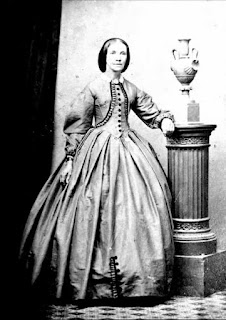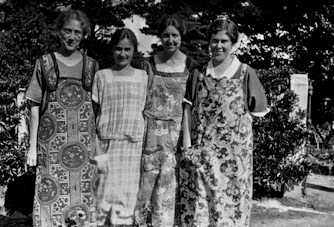30/52 Teams : Louisa Kate Jackson, 1862 - 1949
30/52 Teams: Louisa Kate Jackson, 1862 -1949.
Before supermarkets there were grocery shops. Like Hill Street Grocery shops in Tasmania today, they were often family businesses. As well as grocery items, they extended to hardware and drapery, mens and women’s clothing, haberdashery, as Wells in Latrobe still does today. My great aunt Louisa Jackson was a member of such a family business. You could say the Jacksons were a team. They included parents, sisters and brothers, aunts and uncles, in-laws, cousins, nieces and nephews. They looked after one another and helped out in the several shops in Sheffield. As you read through the English census you can see the development of the family and the businesses, starting in 1851 when Francis Jackson was a 15 year old grocer’s apprentice. By 1861 he was a tea dealer and was making enough money to marry.
Tea from China had started off being a drink of the upper classes but by the middle of the 19th century it had taken off in the working classes. It was cheaper than beer; healthier than unboiled water. It could be drunk weak, so stretching it out further, where coffee could not. Francis Jackson was probably friends with another tea dealer, William Croft, because they married sisters, Francis’s cousins, Annie Eliza and Mary Jackson. Francis’s father and Annie and Mary’s father were brothers from Bridlington, Yorkshire, mariners. Annie and Mary’s family had moved to Hull where their father became a Wesleyan Methodist preacher. Francis and William Croft were dealing in tea there and for a Methodist drinking tea was a salvation from drinking gin.
Louisa Kate, Francis and Annie’s first child, was born in 1862 in Hull, Yorkshire. She was 5 years old when her sister, Edith, was born and 8 when Florence, arrived.
By the time Louisa was 9 years old in 1871 her family had moved to a two story corner shop in Sheffield. The property, two stories, took up two house blocks, 19 - 21 Vine Street. There were four adults living and working there: Louisa’s parents, Francis and Annie, (who was described as a ‘grocer’s wife’}, her uncle, Francis’s brother, (John Jackson, aged 22 who was a grocer’s assistant prior to going on to start out on his own.) a servant girl, aged 16, Louisa’s sisters, Edith 3 and Florence 1 and also the 5 year old cousin, son of Mary and William Croft. The Crofts had moved from tea into hosiery and were still living in Hull.
In 1871 Louisa is listed as a ‘scholar’. She probably went to school, perhaps a church school, or perhaps a government school. In 1870 the Elementary Education Act was an attempt to provide more primary schools and school boards were enabled to make schooling compulsory for children between the ages of 5 and 13, except in cases where children worked, lived too far away from school or were ill. I imagine Louisa left school when she was 14, able to read and write and do basic arithmetic. She probably knew where Australia was, and would have been able to sew. I don’t know about drawing, French or music. She would have started working in the shop,
In the 1881 census the business was described as a ‘Grocer and Draper’. Louisa was 19, a draper’s assistant. People made their own clothes, and a dress at this time needed a lot of fabric. Perhaps not as much as it had in the 1860s, the height of big skirts, when my Godlee great aunt sent 25 yards of fabric to South Australia with the idea of making two women’s dresses and a dress for a child. Louisa now had another sister, Gertrude and a little brother, Frank. No servants are listed in the census or relatives.
In the summer of 1887 when Louisa was 25 she married Robert Edlington, a Sheffield man, four years younger than Louisa. His father, a Master Grocer, was probably someone Louisa’s father knew. Their first child was born only a few months later in October of 1887. It looks like Sydney Edward Edlington might have been conceived on the wrong side of the blanket!
Only three years later, Louisa and her two children, Sydney having been joined by Mabel, were all living with her parents and there is no record of Robert. By this time the Jackson family had moved to Bramall’s Lane where Louisa’s sisters and Frank were all working as Drapers' assistants (the three girls) or grocer’s apprentice. What had become of Robert Edlington? Was there a problem in their marriage? Imagine this: Robert abandoned them and went to London or Liverpool. Perhaps Louisa and Robert patched it up or perhaps Francis or Annie or Robert’s parents, wrote to him and negotiated for him to return, fixed up a job in Sheffield for example. If I were writing fiction I could have fun with this.
Either way, happily or not, they are respectably together again by the next census, Robert doing business as a butter and egg salesman. They are living at 17 Tavestock Street in Ecclesall, Sheffield. Sydney is 13 and is already working as a Printer’s errand boy. Daughter Mabel is 11 and there are three more: two sons, Robert Francis Jackson (Frank), 6 and Fred 4 and another daughter, Winifred, 9. They don’t have any domestic servants. It was a two story red brick single terrace house, not very salubrious.
By 1911 Louisa was almost 50 and Robert was making a crust as an egg salesman. Five unmarried children were all living at home : Sydney (23) now employed as a compositor in a Printers shop. Mabel (21) was a draper’s assistant while Winnie was the unmarried daughter ‘at home’. Frank (16) worked in Agricultural implements and Fred (14) was a grocers’ apprentice. Louisa’s father, widowed since 1900, was 76 and living with them, a retired grocer. He lived until 1913.
Louisa and Robert had two sons sign up in the First World war, Frank and Fred..
In 1939 Robert was the manager of the Egg Warehouse and Winifred was assisting. Sydney was still working as a compositor. Mabel had married a cold storage engineer, an extension of the grocery business and Fred the youngest became a grocer. So the Jackson team carried the family business over three generations, from Francis, through his girls to his grandson, Fred. Louisa’s only brother had not continued the family business and by 1939 had been living in Adelaide, South Australia, for nearly twenty five years. HIs children never knew their Aunty Louisa and Uncle Robert or met their cousins in Sheffield.
World War II hit Sheffield hard. The Steel factories were manufacturing weapons so were a target for bombing raids. The Sheffield Blitz took place in December of 1940 and almost 700 people died. But the Jacksons all survived.
Louisa died in June of 1945, aged 83, survived by her husband Robert and her five children, As far as I can see she only had two grandchildren, Eric and Vera, the children of her daughter Mabel and the cold storage engineer.




Comments
Post a Comment